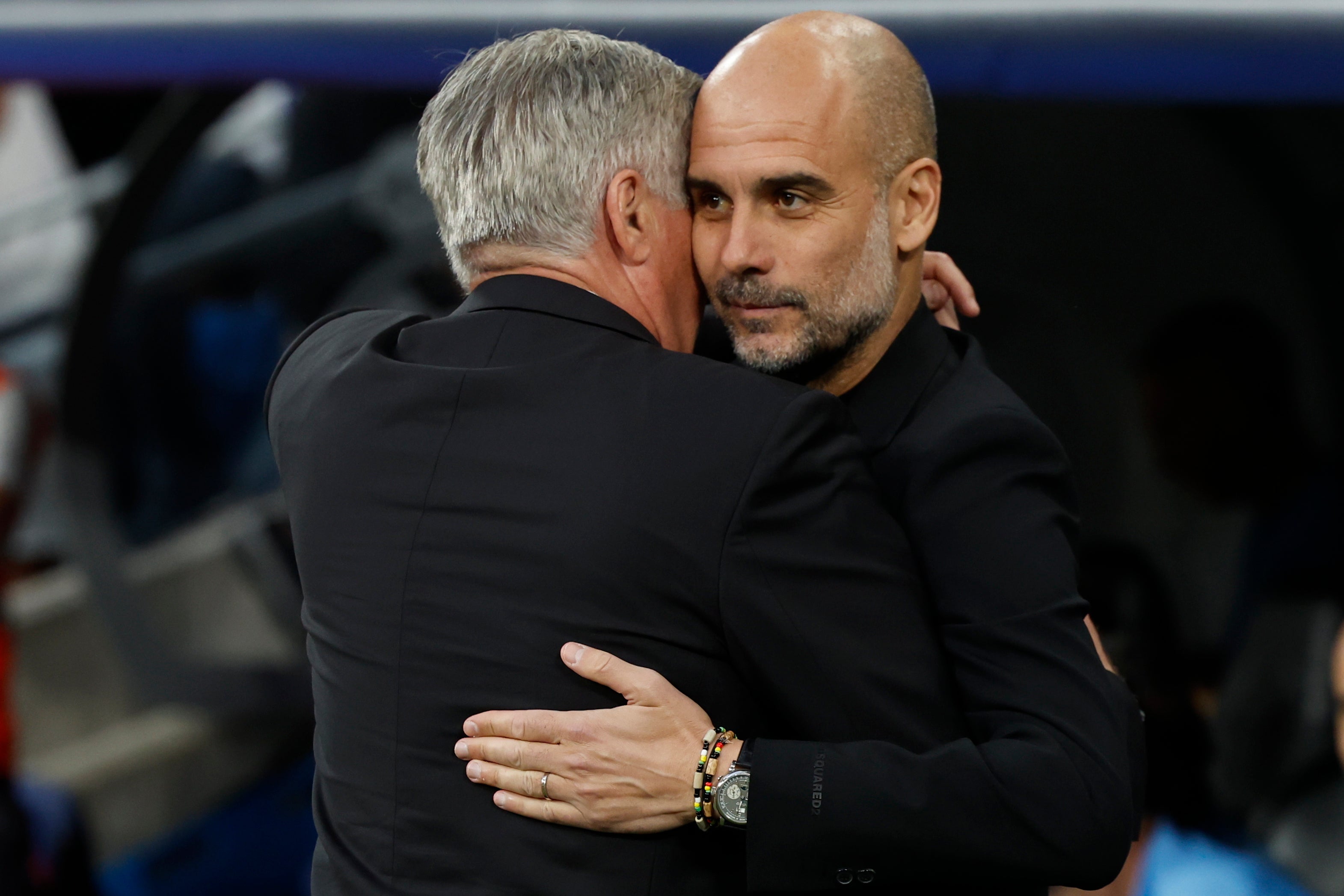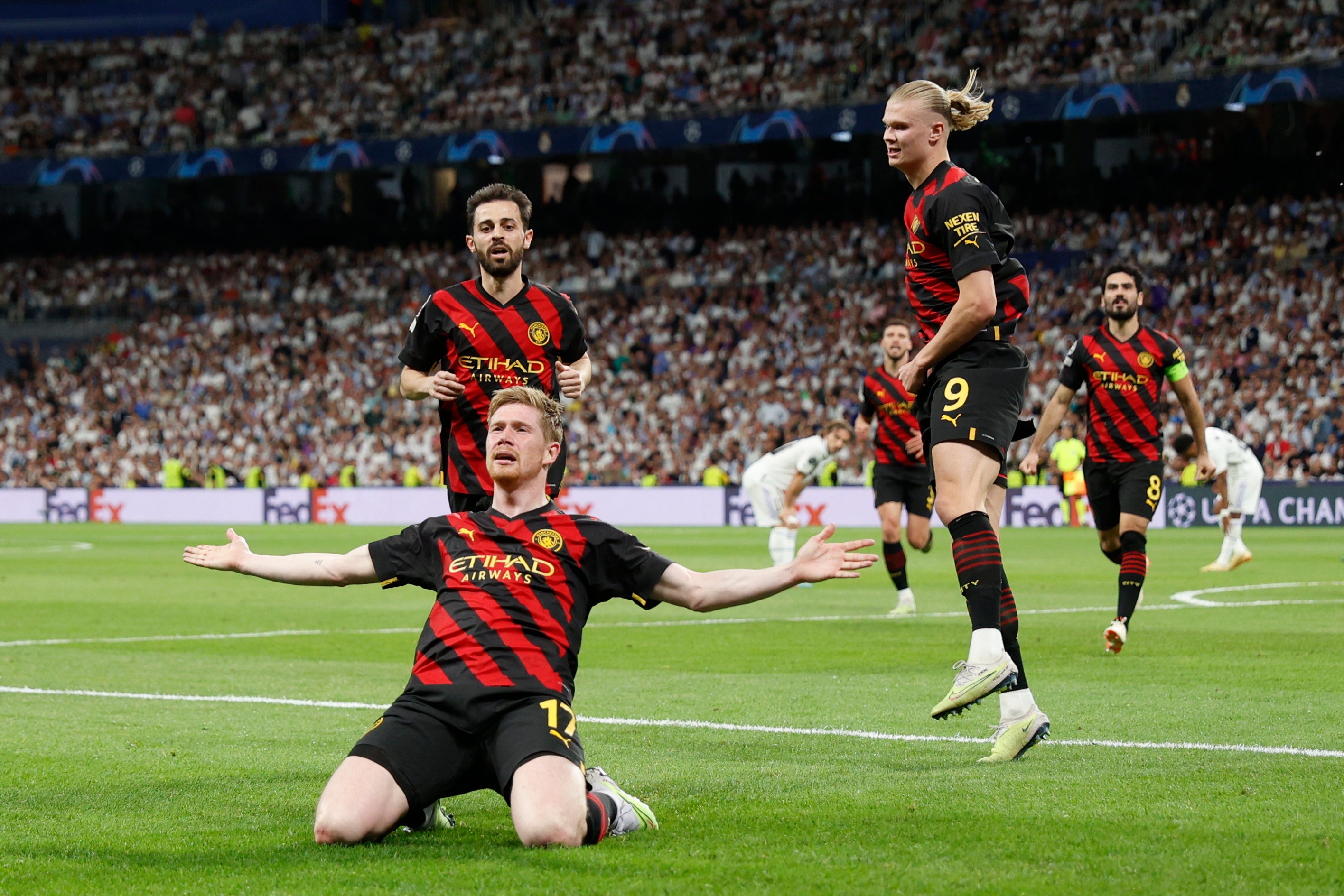Kevin De Bruyne is Man City’s man for the big occasion but has he met his match?
De Bruyne’s thunderbolt secured City a Champions League semi-final first-leg draw at Real Madrid
Your support helps us to tell the story
From reproductive rights to climate change to Big Tech, The Independent is on the ground when the story is developing. Whether it's investigating the financials of Elon Musk's pro-Trump PAC or producing our latest documentary, 'The A Word', which shines a light on the American women fighting for reproductive rights, we know how important it is to parse out the facts from the messaging.
At such a critical moment in US history, we need reporters on the ground. Your donation allows us to keep sending journalists to speak to both sides of the story.
The Independent is trusted by Americans across the entire political spectrum. And unlike many other quality news outlets, we choose not to lock Americans out of our reporting and analysis with paywalls. We believe quality journalism should be available to everyone, paid for by those who can afford it.
Your support makes all the difference.Two satisfying, spectacular thumps of a ball, from similar range, into the same side of the same goal. One arrowed into the top corner, one the bottom. There are times when stages seem designed for players, when they are at that sweet spot where talent and momentum collide, when they have the force of personality to impose their gifts on the major occasion. But when there are two, when they are on opposite sides, Kevin de Bruyne cancelled out Vinicius Junior.
Vinicius got the winner in last season’s final. The sense that De Bruyne, like everyone else at City, remains unfulfilled in the Champions League was underlined by the 2021 final, which he departed with a broken nose and fractured eye socket. It does not mean, though, that his potential has gone unrealised on European nights. De Bruyne scored against Real Madrid in 2020 and 2022 and 2023; if Manchester City had faced them in 2021, he probably would have found the net then, too.
De Bruyne’s goals are rationed these days, saved for the big occasions. Since the start of April, he has scored against Arsenal, Liverpool and Real. He has assisted against every other team he has faced, save for Sam Allardyce’s Leeds, and even that owed more to a remarkable miss from Erling Haaland than managerial brilliance.
Should City’s season end in Istanbul, it will owe much to De Bruyne. But if not, he graced a great ground with a great goal. Under other circumstances, there would be grounds to say City are slight favourites, even in a tournament stripped of the away-goals rule. But not, perhaps, when the opponents are Real.
They trailed for 178 minutes of last season’s semi-final against City and progressed. The equation has altered now, with the second leg at the Etihad Stadium this year, but Real are in a position of parity yet, arguably, a side with no equals.
In their different ways, these two teams are peerless, testing their contrasting approaches to continental superiority. If City may be the best side in Europe, Real are the best at winning the European Cup. Perhaps it shows a flaw in Pep Guardiola’s thinking: Real have lifted the Champions League five times since he last did. But maybe it just highlights the uniqueness of Real: everyone else, after all, wants to be the serial winners of this trophy and, right now, no one else is.

Guardiola has his explanations for City’s enduring inability to conquer Europe. He likes to argue that clubs with a tradition of lifting this trophy possess an inherent advantage, as though an institutional memory of Alfredo di Stefano prompts Karim Benzema to score or Vinicius Junior is transformed into a 21st-century Francisco Gento on a European stage. An alternative explanation is simply that each is an outstanding player: Benzema is the reigning Ballon d’Or winner, Vinicius perhaps the in-form superstar of 2023. Now he has supplanted even the Frenchman as Real’s major threat.
Real have a formula of timelessness and explosiveness, with experience in the middle, pace on the flanks. They struck when Luka Modric released Eduardo Camavinga to fly into space on the left. Vinicius Junior unleashed a thunderbolt. If Kyle Walker was included because he might win a race against the Brazilian, even he can’t travel as fast as the winger’s cannonball of a shot.
Yet the context made it more remarkable. Carlo Ancelotti borrowed from the Allardyce playbook and began on the defensive against City. Real sat back. They absorbed the pressure, but in an unflustered way. But Real play a game of patience better than anyone else. Ancelotti, a booking for dissent notwithstanding, is the most languid of managers and his team have adopted his persona.
Meanwhile, City passed and passed – they had 72 percent of possession in the first 20 minutes – and then one deft flick from Modric made the difference. After the phoney war came a bullet from Vinicius. And then Real grew into game, took more of a turn on the ball, showed more ambition. Camavinga started to appear everywhere; left-backs are not supposed to be this ubiquitous but, like Vinicius, the Frenchman is a relative youngster who seems born for such nights.

And then, just as Real seemed to be turning the screw, De Bruyne delivered. Haaland was finding David Alaba and Antonio Rudiger obdurate opponents. A series of duels were battles between compatriots. Vinicius’ shot flew past Ederson. Toni Kroos, the unlikely enforcer, chopped down Ilkay Gundogan. Thibaut Courtois made a terrific save from De Bruyne.
But not a second. Had City struck from an intricate passing move, it might have seemed Guardiola had brought a Barcelona-esque ethos to the Bernabeu. But it was a moment of individual inspiration. Over the last decade, Real have had more than anyone else in this competition. But there was one apiece in Madrid. Vinicius aimed high, De Bruyne low. Each was a goal worthy of deciding a semi-final, but they can’t both win.


Join our commenting forum
Join thought-provoking conversations, follow other Independent readers and see their replies
Comments